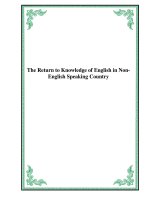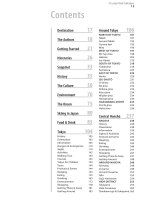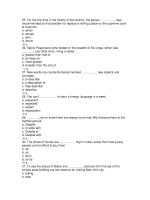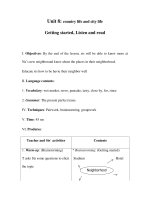Country countrycountry
Bạn đang xem bản rút gọn của tài liệu. Xem và tải ngay bản đầy đủ của tài liệu tại đây (115.41 KB, 7 trang )
LESSON NOTES
Beginner #4
Nationalities
CONTENTS
2
2
2
3
3
4
5
6
Korean Hangul
Romanization
English
Alternative Transcript
Vocabulary
Sample Sentences
Grammar
Cultural Insight
#
COPYRIGHT © 2012 INNOVATIVE LANGUAGE LEARNING. ALL RIGHTS RESERVED.
4
KOREAN HANGUL
1.
(1)KEITH:
안녕하세요? Keith입니다. 처음 뵙겠습니다.
2.
(2)윤설:
안녕하세요? 윤설입니다. 처음 뵙겠습니다. Keith 씨는 어느 나라 사
람입니까?
3.
(3)KEITH:
저는 미국 사람입니다. 윤설 씨는 한국 사람입니까?
4.
(4)윤설:
네. 저는 한국 사람입니다.
ROMANIZATION
1.
(1)KEITH:
Annyeonghaseyo? Keith-imnida. Cheoeum boepgesseumnida.
2.
(2)YUNSEOL:
Annyeonghaseyo? Yunseol-imnida. Cheoeum boepgesseumnida.
Keith ssi-neun eoneu nara saram imnikka?
3.
(3)KEITH:
Jeo-neun miguk saram-imnida. Yunseol ssi-neun hanguk saramimnikka?
4.
(4)YUNSEOL:
Ne. Jeo-neun hanguk saram-imnida.
ENGLISH
1.
(1)KEITH:
Hello, how do you do? I am Keith. It’s nice to meet you.
2.
(2)YUNSEOL:
Hello, how do you do? I am Yunseol. It’s nice to meet you. Keith,
what nationality are you?
CONT'D OVER
KOREANCLASS101.COM
BEGINNER #4 - NATIONALITIES
2
3.
(3)KEITH:
I am American. Yunseol, are you Korean?
4.
(4)YUNSEOL:
Yes. I am Korean.
ALTERNATIVE TRANSCRIPT
Standard Politeness
1.
2.
(1)KEITH:
안녕하세요? Keith이에요. 처음 뵙겠습니다.
3.
(2)윤설:
안녕하세요? 윤설이에요. 처음 뵙겠습니다. Keith 씨는 어느 나라 사
람이에요?
4.
(3)KEITH:
저는 미국 사람이에요. 윤설 씨는 한국 사람이에요?
5.
(4)윤설:
네. 저는 한국 사람이에요.
VOCABULARY
Hangul
R omanization
English
뉴질랜드
nyujillaendeu
New Zealand
외국인
oegukin
foreigner
나라
nara
country
어느
eoneu
which (one?)
사람
saram
person or people
중국
jungguk
China
일본
ilbon
Japan
인도
indo
India
KOREANCLASS101.COM
BEGINNER #4 - NATIONALITIES
3
오스트레일리아
oseuteureillia
Australia
영국
yeongguk
England
캐나다
kaenada
Canada
미국
miguk
America
한국
hanguk
Korea
사우디 아라비아
Saudi Arabia
SAMPLE SENTENCES
매튜 씨는 뉴질랜드 사람입니다.
"Matthew is from New Zealand."
우리 나라에 오세요.
uri nara-e oseyo
"Please come to our country."
그는 외국인입니다.
geu-neun oegukin imnida.
"He's a foreigner."
어느 나라 사람입니까?
"What country are you from?"
저는 한국 사람입니다.
저는 중국 사람이 아닙니다.
jeoneun hanguk saram-imnida.
jeo-neun jungguk saram-i animnida.
"I am Korean."
"I'm not Chinese."
저는 일본에 살아요.
인도에 가 봤어요?
jeo-neun ilbon-e sarayo.
"I live in Japan."
"Have you been to India?"
제 친구는 오스트레일리아 사람입니다.
영국에 가고 싶어요.
"My friend is Australian."
"I want to go to England."
밀은 캐나다의 주요 수출품이다.
저 사람은 미국 사람입니다.
mireun kaenadaui juyo suchulpumida.
Jeo saram-eun miguk saram-imnida.
"Wheat is a big export for Canada."
"That person is American."
KOREANCLASS101.COM
BEGINNER #4 - NATIONALITIES
4
한국 사람입니까?
"Are you Korean?"
GRAMMAR
In this lesson, the speakers describe and ask about each other’s nationalities. The following
are a few grammar notes related to this lesson.
--------------------------------------------------------------------------------------------------------------------Grammar Point #1 - Describing One’s Nationality - 저는 한국 사람입니다
--------------------------------------------------------------------------------------------------------------------To describe nationalities, first, suffix the word 사람 (saram), or in English "person" or "people,"
to the name of the country. Then, utilize the basic sentence structure we have been using to
form a complete sentence:
“Noun 1는(은) Noun 2입니다.”
“(저는) 한국 사람입니다.” (jeo-neun hanguksaram-imnida),
“I am Korean.”
Literally, this means "I, Korea, person, am." This is translated as "I am Korean." To make your
own nationality, just replace 한국 (hanguk) with your country, and follow the rest of the
sentence pattern.
The vocabulary list above features a list of countries and their names in Korean. For the
nationality American, suffix 사람 (saram; person) to 미국 (miguk; America). The resulting
clause, 미국 사람 (miguk saram) translates literally into “America person.” Likewise, an
Australian and a Canadian would be 오스트레일리아 사람 (oseuteureillia saram) and 캐나다 사
람 (kaenada saram), respectively.
Note:This sentence structure utilizes the Formal Politeness Level Simple Present Tense -ㅂ/습
니다 (-m/seumnida). It is a Final-Sentence ending.
--------------------------♣ More Examples ♣
--------------------------a) “저는 중국 사람입니다.” (jeo-neun jungguk saram-imnida)
KOREANCLASS101.COM
BEGINNER #4 - NATIONALITIES
5
“I am Chinese.”
b) “저는 일본 사람입니다.” (jeo-neun ilbon saram-imnida)
“I am Japanese.”
--------------------------------------------------------------------------------------------------------------------Grammar Point #2 - Asking about another’s nationality - 어느 나라 사람입니까?
--------------------------------------------------------------------------------------------------------------------To ask “What nationality are you?” the question, “어느 나라 사람입니까?” (eoneu nara saramimnikka?) is used. “어느” (eoneu) means “which.” “나라” (nara) means “country.” “사람” (saram)
means “people.”"입니다" is the copula, which means "are (is,am)"
“어느 나라 사람입니까?” (eoneu nara saram-imnikka?). The literal translation is, “Which country
people are you?” This is translated as “What nationality are you?”
Note:This sentence structure utilizes the Formal Politeness Level Interrogative (ㅂ/습니까? - m/
seumnikka?). It is a Final-Sentence ending.
--------------------------♣ More Examples ♣
--------------------------A: “어느 나라 사람입니까?” (eoneu nara saram-imnikka?)
B: “인도 사람입니다.” (indo saram-imnida)
A: “What nationality are you?”
B: “I am Indian.”
CULTURAL INSIGHT
As the number of people from other countries visiting Korea is increasing, so is the number of
foreigners in Korea who speak Korean (한국어 or 한국말). But this does not guarantee that a
store owner or the bus driver you want to talk to won't be surprised when you speak Korean.
What does this lead to? More often than not, if you just spit out a phrase you learned by heart
and expect the other person to have understood you, you might be disappointed that they
actually didn't understand you. But don't worry, the reason they don't understand is most likely
because they simply did not expect you to speak Korean. So if you are in Korea, and have
experienced this before, it may be a good idea to say a word or two in Korean to call their
KOREANCLASS101.COM
BEGINNER #4 - NATIONALITIES
6
attention to you, and let them know that you are going to say something in Korean. Try using "
저기요 (jeogiyo)" or "죄송한데요 (joesonghandeyo)", which both mean "Excuse me" in English.
When they give you this look of "Wow, this person is speaking Korean!", it is time for you to
surprise them even more with the phrases you've mastered!
KOREANCLASS101.COM
BEGINNER #4 - NATIONALITIES
7









